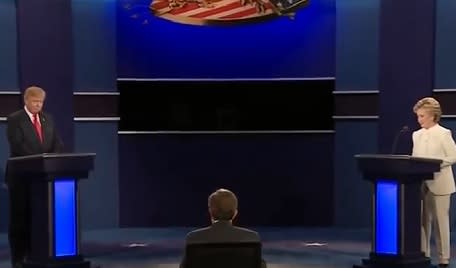Presidential candidates talk Supreme Court, Constitution at final debate
There had been few direct constitutional references in the first two 2016 presidential debates this fall. That changed Wednesday night when Hillary Clinton and Donald Trump spoke extensively about the Supreme Court in the season’s final debate.
You can read a full unannotated, debate transcript from several sources such as Politico. Moderator Chris Wallace opened up the 90 minute-plus debate with a direct question about the Court:
“You both talked briefly about the court in the last debate, but I want to drill down on this because the next president will almost certainly have at least one appointment and likely or possibly two or three appointments which means that you will in effect determine the balance of the court for what could be the next quarter century,” Wallace said. “First of all, where do you want to see the court take the country? And secondly, what’s your view on how the constitution should be interpreted? Do the founders’ words mean what they say or is it a living document to be applied flexibly, according to changing circumstances?”
The candidate’s responses echoed much of what exists on their party platforms.
“I feel strongly that the Supreme Court needs to stand on the side of the American people. Not on the side of the powerful corporations and the wealthy,” Clinton said. “For me, that means that we need a Supreme Court that will stand up on behalf of women’s rights, on behalf of the rights of the LGBT community, that will stand up and say no to Citizens United, a decision that has undermined the election system in our country because of the way it permits dark, unaccountable money to come into our electoral system.”
“We need a Supreme Court that in my opinion is going to uphold the Second Amendment and all amendments, but the second amendment which is under absolute siege. I believe, if my opponent should win this race, which I truly don’t think will happen, we will have a Second Amendment which will be a very, very small replica of what it is right now,” Trump said in his opening statement. He also repeated his public stance that he wants originalist Justices on the Supreme Court.
Related Content: Our Podcast series on The Candidates and The Constitution
During a 10-minute open-response statement, both candidates went into details about more constitutional issues and their concerns.
Clinton defended her stance on the Court’s Heller decision about the right to bear arms, arguing that the original decision in that case sought to protect children from being harmed by guns. Trump repeated his stance that he would do anything he could to protect the Second Amendment. Trump also believed that the appointment of Justices who were sympathetic to overturning the Roe v. Wade decision would lead to that eventual outcome and that states would decide abortion laws. Clinton supported her strong support for Roe v. Wade. The two then engaged in a lengthy discussion of that issue.
Moderator Wallace then went on to the next issue, immigration, and the word “Constitution” wasn’t used in the rest of the debate.
Toward the end of the debate, Wallace asked Trump about his claims that the current election results could be “rigged,” when generated the most-discussed passage of the night.
Wallace asked Trump if he would commit to the principle of a loser in a presidential election conceding to the winner. Trump initially told Wallace that “I will look at it at the time. I’m not looking at anything now, I’ll look at it at the time.” After an argument made by Trump about voter fraud, the media’s role in the election and Clinton’s qualifications, Wallace repeated the question.
“What I’m saying is that I will tell you at the time. I’ll keep you in suspense, okay?” Trump responded.
Clinton then criticized Trump and Wallace moved the debate on to another topic, foreign policy.
Related Stories on Constitution Daily
Explaining how the Electoral College works


